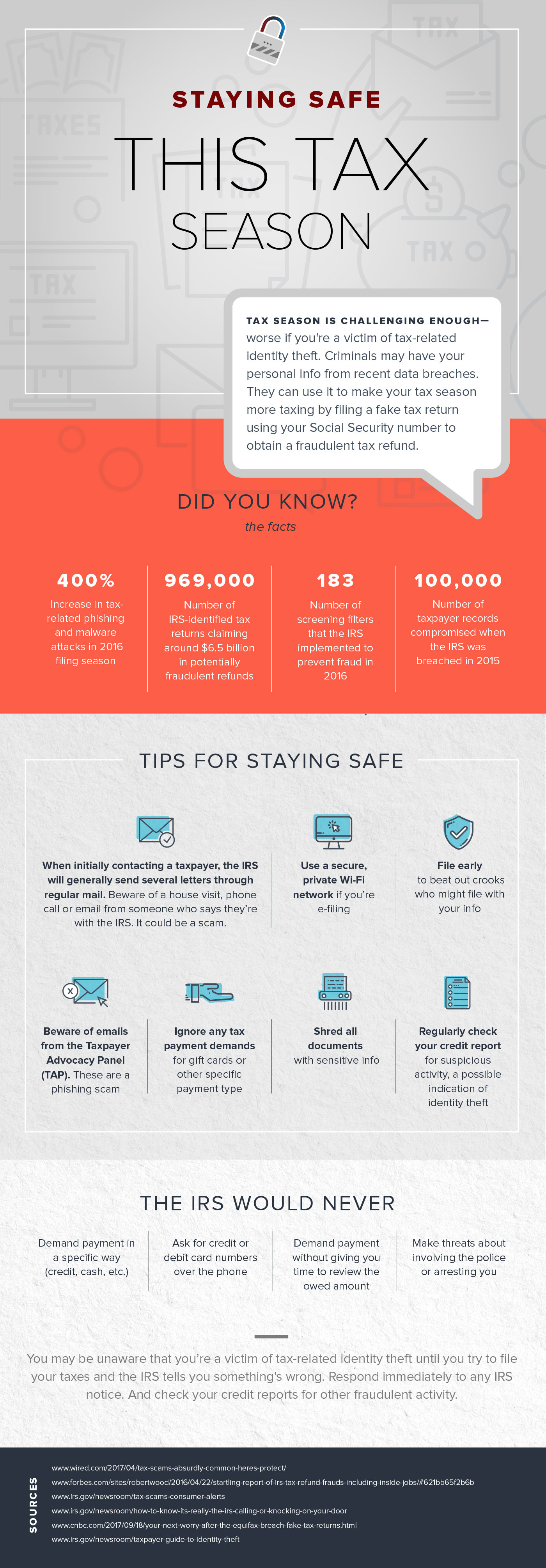Founded by the Federal Trade Commission, Tax Identity Theft Awareness Week sets aside 5 days to encourage and educate taxpayers to protect their tax and personal identification information. As reports show, there was a staggering 400% increase in tax-related phishing attacks during the 2016 filing season. Therefore, it’s important that taxpayers are aware of the common scams in order to protect themselves from determined cybercriminals. From fake IRS phone calls and W-2 phishing scams to data breaches and malware attacks, thieves are more prepared than ever before to exploit vulnerable public, private, and stolen data.
Having a combination of your public information such as your name, address, and date of birth, and private data such as Social Security number or financial statements, can allow criminals to apply for jobs or file taxes in an attempt to collect a tax return. To make the most out of Tax Identity Theft Awareness Week, here are some of the most common scams along with preventive strategies taxpayers can use to protect their information from cybercriminals.
Common Tax Related Scams:
Protecting your personal information from tax thieves and cybercriminals is a year-round task. However, when it comes to defending yourself against these attacks, nothing is more valuable than understanding their underlying goal and the scams and tricks criminals use to collect vulnerable information:
Email Scams –
An extremely common practice among hackers is to represent themselves with fake credentials, using stolen or phony email accounts and a fancy title to collect personal identification information. Using email scams, hackers can represent themselves as IRS employees to request and steal personal information used to commit fraud and identity theft. However, the IRS will never email you, show up at your door, or call you for more information related to your taxes or W-2. The IRS will only contact you via mail. They DO NOT call you or email you.
W-2 Phishing –
In recent years, W-2 phishing attacks are becoming increasingly common. Cybercriminals use this tactic to probe an organization for sensitive employee information. For example, using stolen or phony credentials from a CEO or other high level manager, hackers can email other high-level individuals (such as those within HR), and request the personal information and W-2 financial statements of individual employees. Using the collected information, cybercriminals can collect returns and wreak financial havoc. If you’re in charge of keeping employee information safe, never fulfill any email requests pertaining to tax or W-2 information. Instead, contact the individual making the request and recommend meeting in person.
Get Started With a Free Debt Analysis
We make it easy on mobile or desktop. FREE with no obligations.
Detecting Tax Identity Theft:
Because there are very few warning signs of Tax Identity Theft, the IRS will alert you to any unauthorized or suspicious activity noticed while processing your taxes. To safely address any concerns in a timely manner, the IRS will contact you via the mail when:
- There has been more than one tax return filed using your Social Security number.
- You owe additional taxes or have had collection actions taken against you for a specific year you did not file a tax return.
- The IRS notices you’re receiving wages or income from an unknown employer.
Tips for Preventing Tax Identity Theft:
File Your Taxes Early –
The sooner you file your taxes, the sooner you’ll receive a refund, and the less likely you are to have your refund stolen. According to the IRS, it can take nearly 120 to 180 days (potentially longer) to resolve tax-related identity theft cases.
Protect your Network and Data Transfers –
With 92% of US citizens planning to e-File their taxes, it’s important that individuals file only using a secure network. Public Wi-Fi hotspots could be monitored by cyber thieves looking to intercept tax information. If you’re unable to connect to a private network, consider using a Virtual Private Network (VPN) to ensure an encrypted and private connection while eFiling.
Check Your Credit Report for Suspicious Activity –
Although credit reporting bureaus can help by detecting and alerting individuals to potentially unauthorized activity, it is still possible they won’t catch everything, so guaranteeing the safety of your information requires some attention. Checking your credit report often for errors or unauthorized activity that could be the result of tax identity theft is a great way to dispute potentially fraudulent charges on your credit report and immediately address issues that could delay your tax refund.
Preparing for Tax Season with Advantage CCS:
It’s always a good idea to be as prepared as possible when it comes to filing your taxes each year. This will help with your stress levels and it will make sure you are finding everything you need to make the most out of your deductions and get the biggest refund possible.
Here are a few tips to help you prepare:
- Print out a handy tax checklist to help you assemble all of the tax documents you’ll need to complete your tax return.
- Keep all the pertinent information that comes in the mail in December and January, such as W-2s, 1099s, and mortgage interest statements in one place.
- Be careful not to throw out any tax-related documents.
- Collect receipts, documents, and information that you have piled up during the year.
- Invest in a scanner to make keeping track of important papers and receipts a breeze.
- Group similar documents together, putting them in different file folders that are properly labeled.
Conclusion:
We feel that it’s important to make yourself aware of Tax Identity Theft because if you become a victim the ramifications can haunt you for years to come. It can destroy your credit history and ruin your financial goals. Debt can soon be a new problem you’re facing all because your identity was stolen. It can take a lot of money and time to fight your way out of an identity theft nightmare. You might have to hire a lawyer and pay a large retainer fee for their services or you might let some bills slip through the cracks and end up with late fees because of all the stress you’re under.
Advantage CCS wanted to get involved in Tax Identity Theft Awareness Week because we feel strongly about helping our communities (online and in real life) learn how to better protect themselves and their finances from identity thieves. We want to provide sound advice, tips, and some tools to make sure those thieves never get your personal information for their own personal gain. We believe in educating the public about very important topics such as tax identity theft. It’s been our mission since 1968 to provide informative and educational materials to those who seek to build and protect their financial futures.
Please feel free to check out some of our other blog posts regarding the topics of Taxes and also Identity Theft:
- Do You Really Need To Hire A Tax Professional – https://www.advantageccs.org/blog/do-you-really-need-to-hire-a-tax-professional
- Identity Theft And Identity Theft Protection – https://www.advantageccs.org/articles/identity-theft-protection
- Lower Your Risk For Identity Theft – https://www.advantageccs.org/blog/slide-show-lower-your-risk-for-identity-theft
- What To Do With Your Tax Refund This Year – https://www.advantageccs.org/blog/what-to-do-with-your-tax-refund-this-year
Here’s a great Infographic about Staying Safe This Tax Season:

